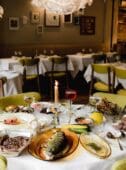
Robin Gill: the Irish Chef Commandeering South London’s Food Scene
If you’ve travelled south of the river for supper recently, chances are it was at the hands of Robin Gill. The restaurateur’s latest opening, Darby’s, offers up oysters with an Irish accent and is set to
“In terms of flavour, sea truffle is 20 per cent the most incredible umami anchovy and 80 per cent white truffle.” Robin Gill, the Irish restaurateur and chef, is discussing a gastronomic eureka moment he had while hunting for produce for his new restaurant, Darby’s, at Embassy Gardens, Nine Elms. “My oyster supplier in Ireland didn’t even realise he had these seaweeds on his doorstep,” Gill continues. “So we brought it up to a local bar with some oysters, and there was this fire burning in the corner of the bar. I chucked some of these oysters directly onto the fire, and what we found was that they would burst open and plump right up, delivering a slightly smoky, peaty flavour. We infused some of the sea truffle into the local whisky, and we ate the oysters with the sea truffle and the whisky. It was just magic.”

Chance – or Gill’s willingness to take a risk – seems to play a pivotal role in his success. That he’s become a ‘one-to-watch’ player on the capital’s intense restaurant scene, appeared as a judge on MasterChef Ireland and been head-hunted for the high-profile restaurant serving Embassy Gardens and its emblematic Sky Pool, is all something – by his own admittance – of an accident.
Gill, 39, was born into a showbiz family in Dublin. His mother was a Riverdance choreographer and his jazz musician father also produced iconic Irish bands such as the Wolfe Tones and The Dubliners, so it’s easy to imagine the pressure to follow in their footsteps. “When I got to the end of school, I panicked,” Gill recalls. “I’d tried music, dance, acting – I didn’t follow through with any of it. What was I going to do? I couldn’t find my niche. So I ended up in the kitchen.”
Coming from a “foodie world” with family who dabbled in the industry meant that the move wasn’t a complete punt, although he only ever received on-the-job training. When some friends made the move to London to further their careers in Michelin-starred kitchens, the 19-year-old Gill came too. With Michelin Guide in hand, he knocked on the doors of the capital’s best restaurants until he found work in the three-Michelin-starred Oak Room Marco Pierre White at Le Méridien Hotel, Piccadilly.

“It was a massive step up,” Gill says. “I had been working in very fast-paced brasseries in Dublin, but there wasn’t the same kind of perfection and finesse as the Oak Room. I was way out of my league. For three to six months it was extremely stressful.”
He recalls being in charge of ordering all the vegetables and not being equipped to recognise their quality. “I would be given a bollocking by someone throwing peas at me saying, ‘What the f*** are these? These are useless – have you tasted them?’ It was a different world.”
Nevertheless, Gill persisted and improved. Four years of six-day weeks at the Oak Room saw Gill become fully trained in classical cooking. Afterwards he travelled to Italy – working in the two-Michelin-starred Don Alfonso 1890 in Naples – where the importance of seasonality began to take hold (a priority reinforced later during a stint working at Noma in Copenhagen). His return to the UK to work at Le Manoir Aux Quat’Saisons was to introduce him to Raymond Blanc, the man he credits as his chief mentor.


“I still talk to him all the time; he’s kind of an advisor,” says Gill. “Raymond’s not only a great cook, but a great people-person and wonderful at bringing young talent into the industry – he’s like the godfather of cooking.” Emerging from beneath Blanc’s wing, Gill’s first head chef role came at Sauterelle at The Royal Exchange; this was also the moment when his personal style began to take shape. “I’d been doing versions of dishes I’d learnt from other kitchens for about two years,” he recalls. “But I built up a good team of like-minded people and they encouraged me to experiment.”
One particular trip to Paris brought a moment of clarity. “I was surrounded by food markets and the restaurants there offered a market menu – led by the markets, led by the best ingredients, the terroir dictating what was cooked. I returned to London and completely changed what we were doing, stripped it right back. Smaller dishes with fewer ingredients on the plate that were cooked really well. That was the beginning.”
Today, Gill is a restaurateur, cookbook author, and former Good Food Guide Chef of the Year known principally for transforming Clapham into a culinary destination, thanks to the presence of his trio of award-garnering restaurants – The Dairy (his first, opened in 2013), Sorella, and Counter Culture. The cuisines served are diverse – British, Spanish, and Italian – but the menus are unified by Gill’s approach to serving the very freshest produce, each dish shaped by what’s available. Sustaining this high standard of ingredients means a plot of West Sussex farmland dedicated to his restaurants, beehives kept on The Dairy’s roof, and scanning social media for supplier recommendations.

Gill acknowledges that it can be hectic, describing how their farm posts photographs of ingredients on his chefs’ WhatsApp group, giving them a week’s notice on yields. “There are constant discussions about ingredients and what to do with them… Too much of something? Pickle it.” But Gill recoils against the idea of making a fuss about it to customers, despite a fairly widely encountered, rather earnest phenomenon of waiters pointing out the provenance of a dish, or the thinking behind it. However, the forthcoming Darby’s offers him a way of doing so, without doing so.
When he was contacted by Embassy Gardens two years ago and shown the sizeable (and, for Gill, rather intimidating) 544-square-metre space for his prospective fourth restaurant, he says he could visualise the concept immediately, one that allowed him to highlight the farm-to-table strategy without “a waiter screaming farm names”.
“From the moment you walk in, you see and smell the bakery. There is a large oyster bar with fresh produce on display, a generous mix of drinks at the 360-degree bar, and a large open kitchen with all the grilling and action. Above the bakery is our in-house butchery and house-made charcuterie. I just want people to listen to some good music – get drunk if they want – and eat well. It’s about the whole atmosphere.”

Named for his father, Darby’s (the original name Earth, Grain and Fire sadly didn’t stick) will be decked out in mid-20th-century design and helmed by Gill, back in the kitchen full-time. It’ll be “big, bold, and exciting”, with live music and a daily ‘oysters and bubbles’ happy hour. The menu draws on the breadth of his European experience, but there’ll be an emphasis on Irish cuisine and produce, with fresh-baked Guinness soda breads served up alongside burnt banana miso muffins, and mains of lobster ravioli or grilled wild turbot. All washed down with homemade vermouths and Irish spirits.
“I’ve spent my whole life running away from food in Ireland, learning Italian cooking, French, British,” he says, “so I really wanted to pay a little homage to where I came from – using ingredients such as Connemara oysters and, of course, that serendipitous sea truffle”.

3 Viaduct Gardens, SW11, www.darbys-london.com








